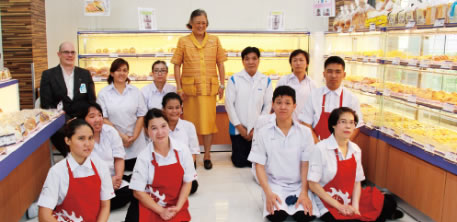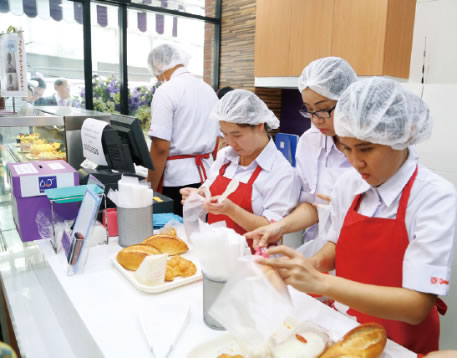Stories from the Field 03
Supporting the Social Participation
of Disabled Persons in Thailand
– A bakery supporting employment and independence

Staff surround H.R.H. Princess Sirindhorn at 60 Plus + Bakery & Café in Bangkok, Thailand. The man dressed in a suit in the back used to be an actor. (Photo: APCD)
In December 2015, the 60 Plus+ Bakery & Café was opened in the Asia-Pacific Development Center on Disability (APCD) in Bangkok, Thailand, commemorating the 60th anniversary of the birth of Her Royal Highness Princess Maha Chakri Sirindhorn who is esteemed by the people of Thailand. This is an initiative of the APCD that utilizes the Grant Assistance for Grass-Roots Human Security Projects1 and other sources of assistance. The initiative provides vocational training for persons with various disabilities, including physical, intellectual and mental disabilities, autism, and other developmental disabilities, aiming to empower them to find work and gain independence.
According to the National Statistical Office of Thailand, as of 2012 there are approximately 1.43 million disabled persons over the age of 15 in the country. However, there are a few places where disabled persons can access education or training. Therefore, employment opportunities are limited and the number of disabled persons who have actually found employment remains at approximately 370,000.
APCD was established in 2002 by the Government of Thailand and the Government of Japan as a center in the Asia-Pacific region dedicated to enhancing the skills of persons with disabilities, and facilitating their empowerment and social participation. In 2009, with the support of the Thai Royal Family, the administration of the APCD was transferred to the APCD Foundation. Since then, based on collaboration between Japan and Thailand, it has been continuing activities aimed at realizing a gentle and inclusive society for all people. APCD has to date implemented various types of training for more than 3,000 disabled persons and the persons concerned.
One of the new initiatives launched by APCD was the 60 Plus+ Bakery & Café. Mr. Ryuhei Sano, General Manager of APCD, says, “We chose a bakery because the food manufacturing industry is a business where disabled persons would easily be able to get involved and there is a good track record in this field in Japan.” Mr. Sano, who himself has a hand disability, was dispatched as a JICA expert to APCD in 2008. Even after the conclusion of the JICA technical cooperation project he has remained at APCD.

Participants in training on product packaging at 60 Plus + Bakery & Café (Photo: APCD)
Mr. Sano and the people at APCD focused their attention on Thai Yamazaki Co., Ltd., the overseas subsidiary of Yamazaki Baking Co., Ltd., a company with high brand recognition in Thailand and running over 80 stores throughout the country. Mr. Sano says, “In actual fact, we had no point of contact with Yamazaki, so I just sent off a letter to the president of Thai Yamazaki requesting cooperation. As a result the president agreed to meet us and kindly consented to work together with us on this project.”
With technical guidance from Thai Yamazaki, disabled persons at the 60 Plus+ Bakery & Café are engaged in all aspects of the business, including not only bread production, but also sales, distribution, customer support and driving the mobile sales units. In the field, the cooperation of Japan Overseas Cooperation Volunteers(JOCV)dispatched to APCD is also very helpful.
Mr. Sano wants to show a model for a “disabled inclusive business” involving persons with disabilities, that exceeds more than just corporate social responsibility (CSR) and social contributions, and can make profit not only for the company but also for society as well.
The 60 Plus+ Bakery & Café makes approximately 100 different types of bread, including bread with sweet bean paste and sandwiches, all made according to the manufacturing standards of Thai Yamazaki. The bread is supplied to a wide variety of companies and organizations which are supporting and cooperating in the activities of the bakery, including Thai governmental organizations (the National Legislative Assembly, Ministry of Social Development and Human Security, Ministry of Foreign Affairs, and the Bank of Thailand, etc.), Japanese governmental organizations (the Japanese Embassy in Thailand, and the JICA Office in Thailand, etc.), and the United Nations Economic and Social Commission for Asia and the Pacific (ESCAP).
Meanwhile, the activities of the 60 Plus+ Bakery & Café were reported in July 2016 by Mr. Prayut Chan-o-cha, Prime Minister of Thailand. Prime Minister Chan-o-cha did so during his weekly television program (broadcast each Friday), in which he directly introduced the government’s initiatives to the people.
Mr. Sano speaks with great emotion as he explains, “In the program the Prime Minister introduced the case of a man in his late 30s who was well known as an actor. He had been injured in a traffic accident that had left him with severe disabilities and had withdrawn from society for a long time. This person was asked to become the publicity representative for the 60 Plus+ Bakery & Café and he gradually regained his confidence. The Prime Minister noted that this actor’s return to active participation in society gave hope and encouragement to many other disabled persons.”
The 60 Plus+ Bakery & Café is already starting to produce results. People who have received training there are starting out on various career paths, including those who have found employment and those who have started their own businesses.
60 Plus+ Bakery & Café aims to create a society in which each and every person is recognized and able to go about their life with dignity. As such, it is an initiative that promotes human security.
*1 Grant assistance for the purpose of socio-economic development in developing countries based on the concept of human security, through which the necessary funds are provided for relatively small-scale projects that directly contribute to people at the grassroots level.
<< Previous Page Next Page >>
Main Text | Statistics and Reference Materials | Stories from the Field | Master Techniques from Japan to the World | ODA Topics
